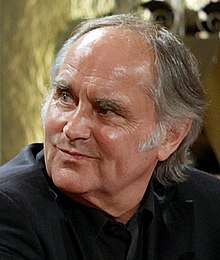Michael Verhoeven
Michael Verhoeven (born 13 July 1938) is a German film director.
Michael Verhoeven | |
|---|---|
 Michael Verhoeven in 2009 | |
| Born | 13 July 1938 Berlin, Germany |
| Occupation | Film director |
| Years active | 1967–present |
| Spouse(s) | |
| Children | 2, including Simon Verhoeven |
| Parent(s) | Paul Verhoeven |
Life and work
Verhoeven is the son of the German film director Paul Verhoeven (not to be confused with the Dutch film director Paul Verhoeven). He married actress Senta Berger in 1966; their sons are actor-director Simon Verhoeven (born 1972) and actor Luca Verhoeven (born 1979). Together, the couple have a production company to make films. The 1970 anti-Vietnam War film, o.k. was entered into the 20th Berlin International Film Festival, but led to a scandal that forced the collapse of the festival without the awarding of any prizes.[1]
In 1982, Verhoeven released Die weiße Rose (The White Rose), which, with the Best Foreign film nomination of Das schreckliche Mädchen (The Nasty Girl) in 1990, cemented his reputation as an important political contributor to German film. Along with his films Mutters Courage (My Mother's Courage) and documentary Der unbekannte Soldat (The Unknown Soldier), they have been hailed as an unstinting examination of Germany's Nazi period. In 1992, he was a member of the jury at the 42nd Berlin International Film Festival.[2]
Awards
- 1990 Silver Bear for Best Director, 40th Berlin International Film Festival for The Nasty Girl[3]
- 1995 Bavarian Film Awards, Best Production[4]
- 2006 Bavarian Film Awards, Honorary Award[5]
Selected filmography
Director
Film
- The Dance of Death (1967) – based on The Dance of Death by August Strindberg
- Up the Establishment (1969) – screenplay by Franz Geiger
- Student of the Bedroom (1970) – screenplay by Volker Vogeler, based on a novel by Finn Søeborg
- o.k. (1970)
- He Who Loves in a Glass House (1971)
- MitGift (1976)
- Gefundenes Fressen (1977) – screenplay by Elke Heidenreich and Bernd Schroeder
- Sonntagskinder (1980) – based on a play by Gerlind Reinshagen
- Die weiße Rose (1982)
- Killing Cars (1986)
- The Nasty Girl (1990)
- Mutters Courage (Mother's Courage, 1995) – based on a story by George Tabori
- Let’s go! (2014) – based on an autobiographical novel by Laura Waco
Television
- Der Kommissar: Dr. Meinhardts trauriges Ende (1970, TV series episode)
- Tatort: Kressin und der Mann mit dem gelben Koffer (1972, TV series episode)
- Ein unheimlich starker Abgang (1973) – based on a play by Harald Sommer
- Krempoli – Ein Platz für wilde Kinder (1975, TV series)
- Die Herausforderung (1975) – screenplay by Elke Heidenreich and Bernd Schroeder
- Bier und Spiele (1977, TV series) – screenplay by Bernd Schroeder
- Das Männerquartett (1978) – based on a novel by Leonhard Frank
- 1982: Gutenbach (1978) – screenplay by Michael Mansfeld
- Verführungen (1979) – screenplay by Elke Heidenreich
- Freundinnen: Edith und Marlene (1979, TV series episode) – screenplay by Elke Heidenreich and Irene Rodrian
- Am Südhang (1980) – screenplay by Manfred Bieler, based on a novella by Eduard von Keyserling
- Die Ursache (1980) – based on a novella and a play by Leonhard Frank
- Die Mutprobe (1982)
- Das Tor zum Glück (1984)
- Stinkwut (1986) – based on a play by Fitzgerald Kusz
- Gundas Vater (1987)
- Gegen die Regel (1987) – screenplay by Daniel Christoff
- Ignaz Semmelweis – Arzt der Frauen (1988) – biographical film about Ignaz Semmelweis
- Die schnelle Gerdi (1989, TV series)
- Schlaraffenland (1990)
- Lilli Lottofee (1992, TV series)
- Eine unheilige Liebe (1993)
- Zimmer mit Frühstück (2000) – screenplay by Conny Lens
- Enthüllung einer Ehe (2000) – screenplay with Nicole Walter-Lingen
- Die schnelle Gerdi, second season (2004, TV series)
- Tatort: Die Spieler (2005, TV series episode)
- Bloch: Vergeben, nicht vergessen (2008, TV series episode)
- Bloch: Heißkalte Seele (2012, TV series episode)
- Bloch: Die Lavendelkönigin (2013, TV series episode)
- Glückskind (2014) – based on a novel by Steven Uhly
Documentary and short films
- Tische (1970)
- Bonbons (1971)
- Coiffeur (1973)
- Liebe Melanie (1983) – film about Melanie Horeschowsky
- Das Mädchen und die Stadt oder: Wie es wirklich war (1990)
- The Legend of Mrs. Goldman and the Almighty God (1996) – with George Tabori
- George Tabori – Theater ist Leben (1998) – film about George Tabori
- Der Fall Liebl (2001)
- Die kleine Schwester – Die weiße Rose: Ein Vermächtnis (2002)
- Der unbekannte Soldat (The Unknown Soldier, 2006)
- Menschliches Versagen (Human Failure, 2008)
- The Second Execution of Romell Broom (2012)
Producer
- Die Spider Murphy Gang (dir. Georg Kostya, 1983)
- Welcome to Germany (dir. Simon Verhoeven, 2016)
Actor
- The Flying Classroom (1954), as Ferdinand
- Marianne of My Youth (1955), as Alexis
- The Crammer (1958), as Peter Wieland
- That's No Way to Land a Man (1959), as Horst Burkhardt
- The Juvenile Judge (1960), as Fred Kaiser
- Mit 17 weint man nicht (1960), as Richard Denger
- The House in Montevideo (1963), as Herbert
- Lausbubengeschichten (1964), as Karl Schultheiss
- Onkel Filser – Allerneueste Lausbubengeschichten (1966), as Karl Schultheiss
- Der Kommissar: Dr. Meinhardts trauriges Ende (1970, TV series episode), as Harro Vogt
- Der Kommissar: Kellner Windeck (1971, TV series episode), as Johannes Windeck
References
- "Berlinale: 1970 Prize Winners". berlinale.de. Retrieved 7 March 2010.
- "Berlinale: 1992 Juries". berlinale.de. Retrieved 27 March 2011.
- "Berlinale: 1990 Prize Winners". berlinale.de. Retrieved 20 March 2011.
- Bayerischer Filmpreis – "Pierrot" Archived 2009-03-25 at the Wayback Machine
- Ministerpräsident Stoiber verleiht Bayerischen Filmpreis 2006 Archived 2012-02-09 at the Wayback Machine, press release (in German)
External links

- Michael Verhoeven on IMDb